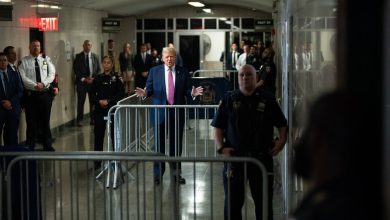No Relief in Sight for Prices


Summer road trips are going to be expensive.Credit…An Rong Xu for The New York Times
America’s inflation is running hot
The latest Consumer Price Index showed a re-acceleration in inflation, dashing hopes that price increases were moderating. The governmentreported that consumer prices climbed by 8.6 percent in the year through May,writes The Times’s Jeanna Smialek. Fed officials are watching for signs that inflation is cooling on a monthly basis as they try to guide price increases back down to their goal, but today’s report offered more reason for worry than comfort. The headline inflation rate was the fastest since late 1981, as a broad array of products and services including rents, gas, used cars, and food became sharply more expensive.
“Inflation is clearly a major problem,” Treasury Secretary Janet Yellen said yesterday at DealBook’s policy conference in Washington. She called the matter President Biden’s top priority, but said that household finances remained robust and that she did not expect a recession. “When you look at opinion polls, when you see what households have to say, it is amazing how pessimistic they are,” given the country has about “the strongest labor market in entire postwar period,” she said. She did not say whether relief was on the way for rising gas prices, which have hit $5 a gallon on average.
Lael Brainard, the vice chair of the Fed and one of its key public messengers, told CNBC that she would need “to see a consistent string” of decelerating monthly prints on core inflation before feeling “more confident that we’re getting to the kind of inflation trajectory that’s going to get us back to our 2 percent goal.”
Inflation is being driven by strong demand, too few goods and service-sector pressures. People have been shifting their spending away from things and back toward experiences as they learn to live with the coronavirus — and inflation has been bubbling up in service industries. Yellen yesterday dismissed claims that Biden’s $1.9 trillion stimulus package was responsible for fueling inflation.
The role of corporate greed is under debate. Yellen yesterday disagreed with some Democrats who say that corporate greed is to blame for rising prices. It is true that companies have been raking in unusually big profits as they raise prices by more than is needed to cover rising costs. But they are able to do that because demand is so strong. It is unclear how long that pricing power will last. (Target is already signaling that it might begin to lower prices as it tries to clear out inventory and keep customers coming.)
Others have pointed to additional factors at play, like tariffs on Chinese goods. “It is beyond me why the president doesn’t lift tariffs today,” Howard Schultz, the Starbucks C.E.O., said yesterday at the DealBook forum. It’s “not the answer to inflation, but inflation is very different today in cause and effect. This is a global issue.”
HERE’S WHAT’S HAPPENING
The PGA Tour suspends 17 golfers playing in the Saudi-funded LIV Tournament in England. Saudi Arabia has invested $2 billion in the series, and top players including Phil Mickelson and Graeme McDowell have been forced to defend themselves from accusations that they are helping to burnish the country’s image in exchange for high payouts.
The Biden administration sets rules of the road for charging electric vehicles. Electric vehicle charging stations built with federal dollars should be positioned along Interstates every 50 miles, be able to recharge cars quickly and be located no more than a mile from a major highway, according to new rules proposed by the White House yesterday.
The committee investigating the Jan. 6 attack opens a landmark set of hearings. Over about two hours yesterday, the panel offered new information about what it characterized as an attempted coup orchestrated by Donald Trump that culminated in the deadly assault on the Capitol. The committee reportedly wants Twitter’s internal Slack messages about how it moderated tweets about the Capitol riot, sources tell Rolling Stone.
Facebook rethinks its deals with newspapers. Meta is reconsidering its commitment to paying for news, The Wall Street Journal reported, in a move that would cause some news organizations to face a significant revenue shortfall. Facebook reportedly pays average annual fees of more than $15 million to The Washington Post, just over $20 million to The New York Times and more than $10 million to The Journal.
The Washington Post fires Felicia Sonmez. Sonmez, a national political reporter who has been at the center of a debate over The Post’s social media policies, was fired over email yesterday afternoon “for misconduct that includes insubordination, maligning your co-workers online and violating The Post’s standards on workplace collegiality and inclusivity.” She sued the paper last year for discrimination, but the case was dismissed in March
Upheaval at Disney
The Walt Disney Company has abruptly fired Peter Rice, its most senior television content executive, citing an ill fit with Disney’s corporate culture, The Times’s Brooks Barnes and John Koblin report.
The ouster of Rice went off like a sonic boom in Hollywood, where he is widely admired. Many people in the entertainment business (outside Disney, at least) had seen Rice as a possible candidate to succeed Bob Chapek, Disney’s chief executive whose contract ends in a few months. Chapek’s decision is sure to generate questions about whether that chatter got a little too loud, with Disney becoming a political punching bag, particularly for Gov. Ron DeSantis of Florida, and Disney’s stock price falling sharply amid industrywide concerns about the profitability of streaming services.
The dismissal took place in a brief meeting. The Hollywood Reporter recounted it as such: “Chapek told Rice that he was not a fit in ‘the new Disney culture,’ to which Rice said words to the effect that he thought they were in the midst of building the new Disney culture. He asked in what way he did not fit and Chapek responded, ‘Now is not the time’ and dismissed him.”
Rice’s sudden departure ruptures a powerful trio that Disney inherited from 21st Century Fox. Rice, Dana Walden, who has been chairwoman for entertainment for Walt Disney Television, and the FX Networks chairman John Landgraf worked closely together at Fox for decades. Chapek announced that Walden would be succeeding Rice in a statement that lacked the glowing platitudes that Hollywood usually turns to in these moments.
Disney’s board said Chapek had its backing, indicating that, despite upheaval, Chapek is headed toward a contract renewal. “In this important time of business growth and transformation, we are committed to keeping Disney on the successful path it is on today, and Bob and his leadership team have the support and confidence of the Board,” Susan E. Arnold, the chairwoman of Disney’s board, wrote in an emailed statement. Another Disney board member, speaking on the condition of anonymity to discuss company matters, said the board had never considered Rice as a candidate for chief executive.
“Once someone starts closing a border, other countries think, ‘Oh, maybe we need to close our borders, too,’ and the whole flow of food stops.”
— Richard Skinner, a Singapore-based food security specialist for the accounting firm PwC. As Russia’s invasion of Ukraine helped push global agricultural prices to soaring heights, some Asian governments restricted the export of products they viewed as essential to domestic food security.
At the DealBook summit: Howard Schultz on the “crisis of capitalism,” Chris Murphy on gun control.
The speakers at the summit made lots of news, and you can catch up on everything here. These are some of the highlights:
“What’s happening in America is much bigger than Starbucks.”
Schultz believes the country is facing a “crisis of capitalism.” This crisis, he said, drove him to return to Starbucks in April for his third round as chief executive. Schultz says the labor organizing reflects the way the government has let down young people, failing to provide them with “a pathway that they believe they deserve.”
“We have to harden our stores and provide safety for our people. I don’t know if we can keep our bathrooms open.”
Schultz, Starbucks’s C.E.O., said that a growing mental health problem in the country was making it difficult for his company’s employees to manage its stores under the current policy, which allows people who are not customers to use store bathrooms. Schultz said that the decision was an “issue of just safety” and that he thought Starbucks might have to put policies in place that limit the number of non-customers who come into its stores.
The move would reverse a policy Starbucks instituted in 2018 after the arrest of two Black men in one of its Philadelphia stores.
“We have better options than hardening every school, every shopping mall, every workplace in the country.”
Senator Chris Murphy, Democrat of Connecticut, argues that aggressively fencing and defending schools and other places where people gather in response to gun violence would turn them into prisons. Instead, companies should take a more active stance, he said: Starbucks, for example, could refuse to allow customers carrying guns to enter rather than simply requesting it. In the senator’s view, it is a minimal risk to businesses to stand for legislation to limit sales, given support nationally for red flag laws and background checks.
THE SPEED READ
Deals
-
Apollo Global Management is among the private-equity firms that have expressed interest in Grubhub, Just Eat Takeaway’s U.S. unit. (Bloomberg)
-
LeBron James wants to own an N.B.A. franchise in Las Vegas. (NBC)
-
A consortium led by KKR made its offer for Accell Group, a bike maker, unconditional. (Reuters)
Policy
-
What Henry Ford can teach us about today’s supply chain mess. (NYT)
-
New Zealand has a plan to tax cow and sheep burps in a bid to curb greenhouse gasses. (BBC)
-
New York’s governor, Kathy Hochul, is proceeding with plans to redesign Penn Station that critics say benefit a campaign donor, Vornado’s Steve Roth. (NY Post)
Best of the rest
-
When a cafe in Helsinki closed, neighbors banded together, chipped in a few thousand dollars each and opened a new one. (Bloomberg)
-
Global companies have reportedly lost more than $59 billion from their Russian operations. (WSJ)
-
NASA will fund a study into U.F.O.s. (NYT)
We’d like your feedback! Please email thoughts and suggestions to [email protected].



